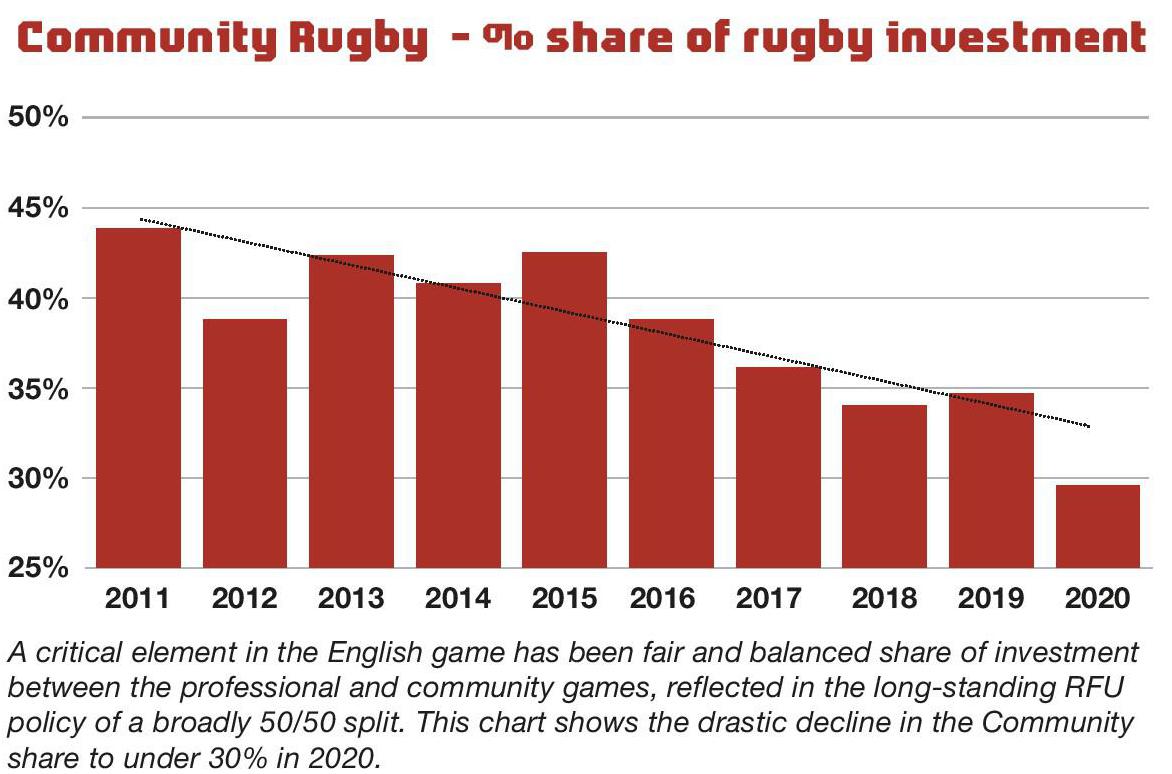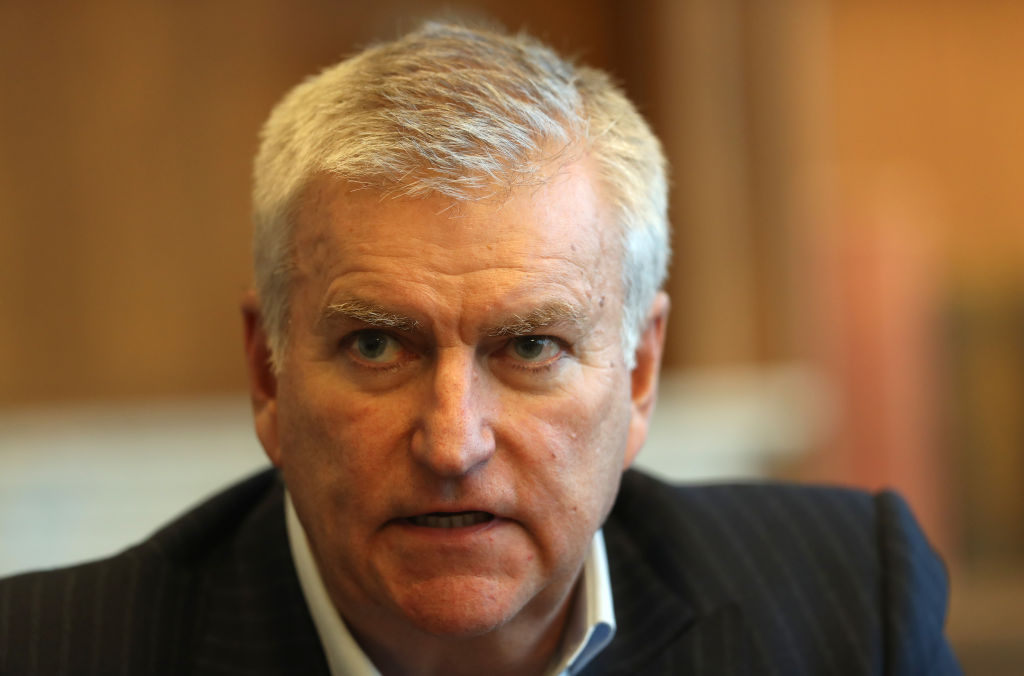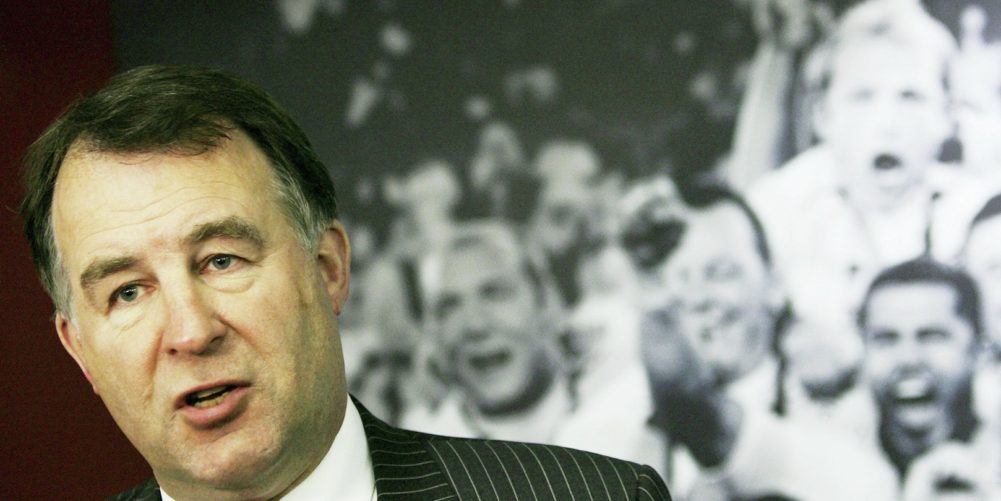NICK CAIN continues his far-reaching interview with Francis Baron, the man who was the most powerful figure in English rugby
THE undermining of democracy at the RFU is a matter of deep concern to Francis Baron, and it is one shared by an increasing number of Rugby Union supporters throughout England.
In Part 2 of his forensic examination of the state of the RFU, former chief executive Baron exposes the erosion of democratic governance at the RFU over the past decade, and points to the growing dislocation between more than 1,400 member clubs, who are the backbone of the English community game, and the governing body.
Baron believes that despite being the shareholders of the RFU, and owners of its main asset, Twickenham, the community clubs are being disenfranchised because the RFU Council (65 members) – the RFU equivalent of a parliament – has voluntarily shelved its authority to veto Strategic Plans.
This means the Council no longer holds the RFU Board of Directors (13 members), or the RFU's executive employees, to account.
Baron reveals how this has resulted in the RFU Board becoming all-powerful, with four independent non-executive directors from outside the game wielding disproportionate influence. It has also led to the member clubs being by-passed, with their essential right to approve major policy and financial decisions which impact on the whole game no longer sought.
Baron argues it is why the RFU has to restore democracy.
Nick Cain: Are democratic principles being restored in sport by popular demand, as shown by the Super League showdown in football, and is the RFU lagging behind?
Francis Baron: “The Super League proposal shows the dangers of putting pure financial interests above all else, especially when it involves a closed-shop. The proposals drawn up without, it appears, any thought for supporters or members and the wider game, reminds us that boards and owners forgetting this cardinal principle do so at their peril.
“It brought on a unique revolt of coaches, players, supporters and politicians of all parties. There are lessons for the RFU and other sports governing bodies, especially a worrying groundswell of political support for Government intervention in sport – even the setting up of a statutory body to govern football in place of the FA. Rugby Union has to be careful.
“It was also interesting and relevant to see that the All Blacks Players Association recently told the NZRFU that they would not approve the approach by the US private equity firm Silver Lake to buy a 15 per cent stake in the All Blacks commercial rights for £235m.”

NC: Should huge financial decisions in English rugby, such as the East Stand redevelopment (£80m), the sale of additional rights to Compass Group (£96m), and the sale of a 14.3 per cent share of the Six Nations to CVC (£365m overall / RFU share £95m) be taken by the RFU Board without approval by members/Council at an AGM/SGM?
FB: “Our members own the RFU, they are the RFU's shareholders. As such they should have the same rights as those shareholders in a PLC.
“It is an established PLC standard (LSE Listing Rule 10, FCA regulations and in the Companies Act 2006) that shareholders/ members should be asked to approve, usually via an SGM, any proposed transaction involving the sale or acquisition of assets exceeding 25 per cent of the company's assets or profits.”
NC: Has the RFU Council been neutered to the extent that it no longer provides a democratic checkand-balance on the powers of the Board or chief executive?
FB: “There has undoubtedly been a significant reduction in the rights and powers of Council and members in favour of the Board of Directors.
“In particular, members should have the right to approve, or otherwise, any major issue likely to affect the future of the game. This includes promotion and relegation; the sale of key rugby assets to external financial investors; and any material changes to the principal of fairness in the community/professional game funding split.
“Council needs to have real powers to discharge its responsibility for major policy issues. If not, it is difficult to justify such a large body (65 members) and its significant costs.
“Its ability to say ‘no' must be restored. Council should not just be an echo chamber for the Board. It is there to constructively challenge the Board and the executive and, if necessary, say ‘no' to policy proposals it does not like and to propose alternative courses of action.”
NC: How concerned are you that members can no longer table and vote on motions at AGMs, and instead can only raise matters for consideration by the Board?
FB: “A basic right of shareholders in a PLC if they are dissatisfied with either the Board's performance, or that of any director, is to be able to remove them and/or propose alternative or additional directors. RFU members have no such right under the new rules.
“AGMs are traditionally events to discharge statutory duties, and therefore it is not unusual for them to be tightly controlled and to limit other business. The mechanism for shareholders/members to table substantive motions is through convening an SGM.”
NC: Has accountability become the biggest casualty at the RFU, and how would the introduction of member-appointed non-exec directors (MNEDs) to the Board improve the situation?
FB: “The RFU Board's obsession with ‘governance' has resulted in a corporate mind-set that ‘good governance' will inevitably lead to ‘good performance'. In the real world it doesn't.
“I am concerned that accountability has been lost, and that a lack of focus and investment in the Community game has resulted. From what I understand no director voted against the hugely expensive PGA agreement, and no director fought the corner over the falling Community investment split now below 30 per cent
“No wonder constituent bodies such as Buckinghamshire felt necessary to send an open letter saying that, ‘to be told that the RFU's resources both financial and human will all but disappear has led to incredulity and dismay within our County'.
“One way to re-balance the position if members are concerned about the RFU Board's policy direction is to give them the right, as in PLCs, to propose member-appointed Non-Executive Directors (MNEDs), whose focus would be on the Community game. This would be instead of one or more of the external Independent Non-Executive Directors (INEDS). This could be achieved by giving members the right to propose one or more MNEDs to the Board if supported by five per cent or more of members from at least three dif-ferent constituent bodies.
“Members will recall that pre- 2012 they had the right to propose and appoint the Chairman of the Board. Although this did not always go smoothly at least members knew they had someone on the top table that could be removed if he did not perform.”
NC: Have the independent non-exec directors (INEDs) exceeded their brief in making the Board largely non-accountable to the members/Council?
FB: “I was concerned by the recommendation by the leading City law firm, Slaughter & May, in 2011 that the Board should appoint three INEDs. I felt, based on my PLC back¬ground, that they would tend to dominate the Board with their extensive PLC experience, which most of the Council-appointed non¬executive directors did not have.
“The situation has been accentu-ated in recent years as the Board Nominations Committee (made up of three INEDs and one other director) have selected as chairman another INED – so we now have four INEDs on the RFU Board, not three. The Sport England Code also sets a limit of 12 on boards. I understand that the RFU Board intends to reduce in size to meet this target. It is likely that one of the Councilappointed directors will be removed, rather than an independent.
“The transfer of powers from the Council to the Board in the recent governance reviews have resulted in INEDs having excessive and undemocratic influence on decision-making and policy.”
NC: Are there good reasons why the Strategic Plan policy introduced in 2001 – which stated that the RFU be managed, administered and governed to PLC standards – was abandoned after 2013?
FB: “When I introduced a policy of eight-year Strategic Plans in 1999 my aim was to unite the game behind one vision after the very difficult early years of professionalism had created many opposing factions. We did a large number of ‘roadshows' around the country explaining the Plan to member clubs to secure ‘buy in' and support for the new approach to policymaking. Each eight-year Strategic Plan was to be reviewed, revised, and updated every four years. I produced three very detailed Strategic Plans – 2000 (128 pages), 2005 (145 pages) and 2008 (201 pages).
“The reason for the detail was to provide a comprehensive framework to enable constituent bodies, counties, and clubs to plan forward with a degree of certainty.
“The requirement that the RFU be managed and governed to PLC standards was included in the first Plan in 2000 and repeated in each of the two subsequent Plans.
“The 2008 Plan – which was to run through to 2016 – remained RFU policy until amended or replaced.
However, I can find no evidence that this policy was followed by the new restructured Board, and there is no reference to it in the new Strategic Plan issued in 2013, or that issued in 2017.”
NC: Is there still an RFU Strategic Plan?
FB: “The words ‘Strategic' and ‘Plan' are well defined English words. I don't think the two RFU Board documents of 2013 and 2017 (both 36 pages) meet those definitions. I view them as being no more than a broad statement of intent rather than a Strategic Plan.
However, I have every confidence that CEO Bill Sweeney is working on a post-Covid Recovery Strategic Plan. This plan must contain a clear and defined set of ‘financial rules' to enable Council to effectively discharge its responsibilities of holding the Board to account, and to focus attention on fair funding for the Community game.”

NC: Why has there been so little coherent policy transfer from one RFU administration to the next?
FB: “Key to all successful organisations is a thread of continuity as new personnel take over as chairman, CEO, or Board directors. New incumbents in office should make themselves aware of existing plans and policies, and seek to build on past strengths while addressing any past weaknesses. From meetings I have had it is clear to me this has not happened at the RFU.
“While any new chairman or CEO will inevitably want to do things ‘their way', it is usually unwise for new incumbents – in the absence of a collapse – to seek to start again from scratch.
“Continuity is difficult when there are frequent changes in senior positions. In this case the RFU has been particularly unfortunate, or careless, with its CEOs. In the last five years there have been five CEOs or acting CEOs (Ian Ritchie, Andy Cosslett (acting), Stephen Brown, Nigel Melville (acting), Bill Sweeney).
“As a result, I believe that continuity was lost at the RFU with the major changes made after 2013 to corporate governance, Board composition, CEOs, and the reduction in Council's powers. This inevitably led to the lessons and good practice of the past not being passed on.”
NC: What impact has this erosion of democracy had on the RFU's effectiveness?
FB: “There has been what can only be described as an obsession by the Board with ‘governance' issues over the last five years at the expense of ensuring the best financial and rugby performance by the RFU.
“I was concerned when reading the 2017 Chairman's Annual Report that virtually the whole of it was about ‘governance'. Indeed, the chairman stated in it that the RFU's objective was to “have the best possible corporate governance”.
“There was not a single mention in this report of the concerning loss of £7.7m made in that year (a year with three home Six Nations matches should have resulted in a substantial profit), debt rising by £38m, and reserves all but disappearing.
“Since 2011 the RFU has conducted three full “Governance Reviews”, including the major 166-page Slaughter & May report, which made scores of recommendations.
“The Board has also commissioned at least two “Reviews of Board Effectiveness” by external consultants. This is surprising because the recommended appointment of three PLC experienced INEDs was, in part, aimed at ensuring such ‘effectiveness'.
“In addition, Sport England issued a “Code for Sports Governance” in 2016, which the RFU also seems to be following to the letter. This includes elements that are undemocratic.”
NC: Do you believe that the review culture at the RFU has become an impediment to its main mission of promoting Rugby Union from a strong administrative and financial base?
FB: “You have to question the effectiveness of the proliferation of reviews. There have been further lengthy internal RFU reviews. This included one on Privilege Members rights, where the main outcome was to change the name from ‘Privilege Members' to ‘Distinguished Members'!
“Another review focused on Diversity and Inclusiveness on Council and in the game. This was undertaken despite the clear RFU Policy on these subjects set out in the Strategic Plans of 2000, 2005 and 2008.
“It considered whether Twickenham fans should be allowed to sing Swing Low, even though that icon of the 1960s and 1970s US Civil Rights movement, Joan Baez, regularly performed the song at concerts, and put it on her best-selling The Essential Joan Baez album.
“Most recently the RFU seems to have outsourced the management of the England head coach to an external and anonymous panel of experts – even though this is a key responsibility of the Board's role of day-to-day management of the Union.
“With all these reviews, internal and external, members could rightly ask the question ‘who is running the shop'? Yet, what we haven't had is a review of the Board's financial and rugby performance – which is why I produced my three detailed Financial Review Reports of 2014, 2018 and 2019.
“It is important to remember that good governance is a means to an end, NOT an end it itself. Governance should be deemed to be ‘good' only if it leads to ‘good' performance. If performance is not ‘good' then things have to change. A reset is required.”
NEXT WEEK: My recommendations to reset the RFU



























